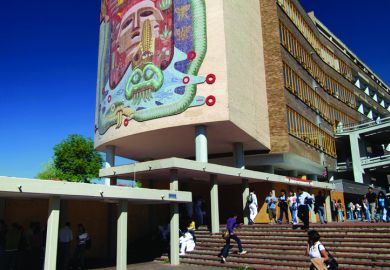Researchers have warned of a growing crisis in science in Latin America as new analysis lays bare how low salaries, underfunding and excessive bureaucracy are fuelling a brain drain of scholars.
Academics have described waits of several months to get broken equipment repaired, having to choose between paying to publish in high-impact open access journals or buying more reagents for experiments, and struggling to contend with poorly defined research policies, as they call on South America’s governments to wake up to the fact that their economic futures depend on technology and innovation.
Daniel Ciocca, a member of the National Research Council of Argentina, said that it was difficult to conduct research in the region.
“The grant that [the government] supplies for doing research is very low, so that is a stressful situation for the researchers,” he told Times Higher Education. “In Brazil or Argentina, because of the bad economic situation, you get a grant and you don’t get the money that they promised to you. They stop [paying] because [of] the ups and downs of the economy.”
Dr Ciocca, principal investigator at the Institute of Experimental Medicine and Biology in Mendoza, is the co-author of a new paper that outlines how many Latin American countries spend less than 1 per cent of their gross domestic product on research, compared with an average of 2.4 per cent among more developed nations.
As a result, a typical government grant for a research group or laboratory in the region is between $5,000 and $40,000 (£3,900 and £31,400), well below Western comparators.
Higher education and research in major Latin American countries: key data
| Country | % of GDP spent on R&D | Researchers per million people | Journal articles per year | % of government expenditure spent on tertiary education |
| Argentina | 0.58 | 1,121 | 8,053 | 3.1 |
| Brazil | 1.24 | 698 | 48,622 | 2.5 |
| Chile | 0.36 | 320 | 5,158 | 4.9 |
| Colombia | 0.23 | 193 | 4,456 | 3.3 |
| Mexico | 0.50 | 312 | 13,112 | 3.4 |
| Uruguay | 0.32 | 549 | 591 | 4.0 |
Source: World Bank, latest figures available
The paper describes a lack of clear rules for allocating public research funding, “which is sometimes distributed based on political alliances”, and a reluctance of private companies to invest in innovation. It highlights the “plague” of bureaucracy: Argentina’s science ministry has 19 independent agencies, it points out.
The paper, published in Cell Stress and Chaperones, says that scientists in many Latin American countries “do not have a salary in accordance with their education, knowledge and contribution to society”, and are paid much less than comparable professions. This makes it difficult for them to buy a house and to support their families.
Many researchers in the region are forced to publish their discoveries in journals that do not charge for publication, which typically have lower impact factors, and many universities have not signed agreements to access leading periodicals, meaning that scientists often struggle to obtain copies of influential research articles.
Meanwhile, there are particular problems with the purchase of reagents and laboratory equipment, which are typically not excluded from taxes designed to protect national products and are often delayed in customs, affecting the quality of products.
Dr Ciocca told THE that laboratories in Argentina were “always running behind the new equipment”. When instruments break, it can take time for the manufacturers, which are based abroad, to come to fix them. Manufacturers often wait until several of their products need repair before coming to fix them, in order to justify the cost of travelling to South America, he added.
Dr Ciocca also said that he regularly published his work in journals that do not charge article processing fees, even though they may not have the impact factor that he would like, so that he does not have to spend $3,000 of his research funding on publishing. “We prefer to do more research with the money [rather] than spending it on travel or publication fees,” he said.
Salaries for researchers in major Latin American countries
| Country | Researcher’s salary, leading research institution (£ per year)* | University professor’s salary (£ per year) | Judge’s salary (£ per year) | Senator’s salary (£ per year) | Approx. cost of two-bed apartment in capital (£) | Approx. cost of new medium-sized car (£) |
| Argentina | 11,300-28,300 | 18,900 | 94,200 | 56,500 | 141,300 | 18,800 |
| Brazil | 16,000-37,700 | 37,700 | 94,200 | 75,400 | 157,000 | 14,500 |
| Chile | 18,800-47,100 | 47,100 | 66,000 | 113,100 | 117,800 | 11,000 |
| Colombia | 28,300-66,000 | 28,300-75,400 | 47,100 | 94,200 | 157,000 | 14,900 |
| Mexico | 20,700-33,000 | 33,900 | 59,400 | 63,100 | 149,200 | 12,200 |
| Uruguay | 24,500-33,000 | 33,000 | 40,500 | 32,000 | 149,200 | 17,300 |
* Range from young researcher in first position to researcher with 30 years’ experience
Source: “The reality of scientific research in Latin America: an insider’s perspective”, Cell Stress and Chaperones
The consequence, according to “The reality of scientific research in Latin America; an insider’s perspective”, authored by Dr Ciocca and Gabriela Delgado, a researcher at the National University of Colombia, is that many researchers choose to leave the region. For example, the number of people with a doctorate has increased significantly in Argentina in recent years, but only half have been absorbed into the national scientific system. One in five has gone abroad, and the rest have gone into other careers.
Researchers in Chile are facing similar problems to those in Argentina, according to José Salazar, director of the academic division of the University of Valparaíso.
Since 2013 there has been an influx of newly qualified postdoctoral researchers who went abroad to complete their PhDs and are now returning to Chile. “But it has not been so easy to have conditions [in Chilean universities] to develop their work. Also we don’t have clear priorities for them to accommodate the policy perspective in their work,” he said.
He added that although the quality of Chilean science is well regarded internationally, funding levels have not increased for a decade. Since the student protests of 2011, research has become the “poor relation” of undergraduate education because much of the focus of higher education policy has been on creating a system that is efficient and open to the whole of society.
POSTSCRIPT:
Print headline: Lack of funds fuels science crisis in Latin America
Register to continue
Why register?
- Registration is free and only takes a moment
- Once registered, you can read 3 articles a month
- Sign up for our newsletter
Subscribe
Or subscribe for unlimited access to:
- Unlimited access to news, views, insights & reviews
- Digital editions
- Digital access to THE’s university and college rankings analysis
Already registered or a current subscriber?








